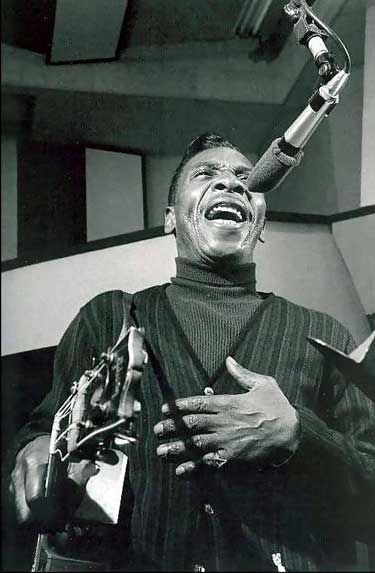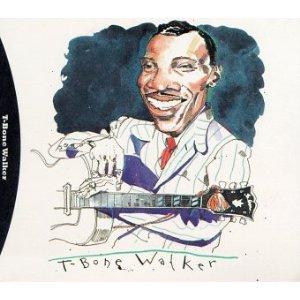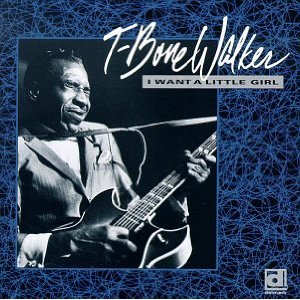A Listener’s Guide to T-Bone Walker
Sorting out the album catalogue’s essential dozen
By David McGeeT-Bone Blues (1960; Atlantic, 1989)
Well Done (1970; Collectables, 1990)
Dirty Mistreater (1973; MCA, 1983)
I Want a Little Girl (Delmark, 1973)
Joe Turner and T-Bone Walker: Bosses of the Blues—Volume 1 (RCA Bluebird, 1989)
The Complete Recordings of T-Bone Walker, 1940-1954 (Mosaic, 1990)
The Complete Imperial Recordings, 1950-1954 (EMI, 1991)
The Complete Capitol/Black & White Recordings (Capitol Blues Collection, 1995)
Stormy Monday (Laserlight, 1996)
Stormy Monday Blues: The Essential Collection (Half Moon UK, 1998)
Blues Masters: The Very Best of T-Bone Walker (Rhino, 2000)
Good Feelin’ (Sunny Side, 2007)Trace the arc of blues history from the country blues to big band swing to post-War electrified urban blues to rhythm and blues to the dawn of soul music, and one name is everywhere: Aaron Thibeaux Walker, popularly known as T-Bone Walker. Through most of these eras, Walker was more than a mere participant—he was doing much of the reshaping of the landscape around him before moving on to discover new worlds.
Born into a musically inclined family in Linden, Texas, in 1910, Walker took up guitar at age 13. Scrapper Blackwell, who accompanied blues pianist Leroy Carr, was an early influence, but two other blues giants would exert an even greater sway over the aspiring picker’s stylistic evolution. One was Lonnie Johnson, whom Walker was able to study during Johnson’s frequent forays into the Dallas area; the other was the formidable country blues artist, Blind Lemon Jefferson. From Johnson, Walker adapted a single-string soloing style that he developed into a voice at once direct, evocative, economical, inventive, and tender or tough as the material demanded. Jefferson’s idiosyncratic guitar stylings and lyrical folk poetry left an indelible imprint, as Walker absorbed the master’s lessons while leading him around the Dallas streets where Jefferson played for tips. More so than Johnson, it was Jefferson’s raw, emotional approach that informed Walker’s first recordings, “Trinity River Blues” b/w “Wichita Falls Blues,” made in 1929 for Columbia, on which he was billed as Oak Cliff T-Bone, Oak Cliff being the section of Dallas where he lived. When that record didn’t sell, Columbia dropped Oak Cliff from the label. By that time Walker had a full schedule playing with a group of school friends in the Lawson-Brooks big band, an affiliation that continued until 1936, when he headed west to Los Angeles’ thriving R&B scene; his place in Lawson-Brooks was assumed by a promising young guitarist named Charlie Christian.
T-Bone antecedents: Blind Lemon Jefferson, ‘Black Snake Moan’A 1939, while working with the Les Hite Band, Walker was signed to the fledgling Varsity label and cut “T-Bone Blues,” which brought him some attention, although he didn’t play guitar on the session. Even so, he was then beginning his early experiments with the newest sonic innovation on the block, the electric guitar, and, along with Christian and a handful of other players, began breaking new ground. Signed to the nascent Capitol label in 1942, he made a statement with his early release, “I Got a Break, Baby.” Nearly a minute passes at the outset with nothing but soloing from Walker, everything from frisky single-line runs; sustained bent notes; ostinato riffs morphing into screaming three-note chords; rich, legato phrases; speed-picked single notes cartwheeling one over the other. Then Walker the vocalist enters, casual but confident, swinging his phrases with Joe Turner-like assurance. The whole package was there, and from that foundation he would move on to write his name large on virtually every succeeding trend in black music up to his death in 1975.
After a year with Capitol, Walker jumped to another new label, Black & White, in 1945, following the lifting of wartime restrictions on materials used for recording. The 50-plus songs he recorded in a variety of contexts over the next five years rank with the essential blues art of the 20th Century. In it are signposts to B.B. King’s warm, single-string lyricism, to Albert Collins’s blazing, hard-picked attacks, to Albert King’s hearty but unusually tender voicings—the list goes on and on, encompassing about every important guitarist who came after T-Bone in the ‘50s, ‘60s, and ‘70s.
T-Bone antecedents: Lonnie Johnson, memorably introduced by Sonny Boy Williamson, performs an elegant ‘Another Night to Cry,’ spiced with some of his single-string magic. The awesome band features Willie Dixon on bass, Otis Spann on piano and John Jackson on drums.So dynamic an entertainer and so arresting an instrumentalist was Walker that his vocal chops are still the most overlooked feature of his artistry. A mid-1949 session produced “Don’t Give Me the Runaround,” a languorous jazz-pop fusion in the style of the King Cole Trio, featuring Walker emoting in a silky, seductive voice that could easily be mistaken for the smoky gray crooning of Cole himself; a swinging bit of Louis Jordan-style small band novelty, “I Know Your Wig is Gone”; and Walker’s self-penned Mt. Rushmore of a blues song, “Call It Stormy Monday, But Tuesday Is Just As Bad.” In 1950 Walker joined the Imperial label for what turned out to be a four-year stint that was an aesthetic extension of the marvelous Black & White years in its ongoing redefinition of modern blues. In addition to being a touchstone for musicians who came in his wake, Walker was a popular figure with the general public: a galvanic live performer, his club dates across the country invariably drew packed houses, and many of his ‘40s and ‘50s singles routinely peaked in the upper reaches of the R&B chart.
The Black & White and Imperial recordings are given a complete overview in Mosaic’s pricey (as in $200) six-CD set, The Complete Recordings of T-Bone Walker, 1940-1954. Otherwise, the Capitol Blues Collection’s fine three-CD package, The Complete Capitol/Black & White Recordings, is, as its title suggests, the complete picture of Walker’s early artistic breakthroughs, including “I Got a Break, Baby”; the first version of “Mean Old World” (which became a staple of his live shows and something of a signature song); two versions of “T-Bone Shuffle”; and the original and alternate versions of “Call It Stormy Monday, But Tuesday’s Just as Bad.” An absence of personnel or other detailed sessionography information is puzzling given the scope of this project, but blues authority Pete Welding’s informed liner notes are a huge plus in complementing the music on this essential collection. The other ne plus ultra of T-Bone collections is The Complete Imperial Recordings, 1950-1954, containing all 52 songs Walker recorded for the label (minus six alternate versions excluded owing to space limitations), plus four tracks cut in New Orleans with Dave Bartholomew and some of the same musicians who played on Bartholomew-produced Fats Domino recordings. T-Bone made many fine recordings over the two decades beyond these collections’ purview, but the tracks on these two anthologies represent the heart of the matter, the work the inspired some of the greatest blues artists of the last half of the 20th Century, continues to inspire today’s developing blues generation, and without which no respectable blues collection could be called complete or representative.
In 1955, with the rock & roll era dawning, Walker signed with Atlantic, and over the next four years cut 15 sides with producers Jerry Wexler, Ahmet Ertegun and Nesuhi Ertegun. By the end of his Atlantic tenure, R&B, child of gospel and blues, was mutating into soul, child of gospel, blues, R&B and pop, and bringing with it a broad-based, young audience that regarded Walker’s generation as yesterday’s news, as these artists’ declining sales figures indicated. Yet the Atlantic recordings, issued in 1960 as T-Bone Blues, were swept up in the folk and blues revival of that time, and jump-started Walker’s career, albeit on a smaller scale than he had experienced the previous two decades. Working small clubs, colleges and festivals, he won a new following and gained recognition as an important jazz instrumentalist.
In 1968-69 Walker cut several sessions with jazz producer Bob Thiele, who surrounded him with the cream of Los Angeles’ jazz-rock players (including Tom Scott on tenor sax). Ten of these are contained on MCA’s Dirty Mistreater release (which Amazon now shows as being available only on vinyl), and seven on Bluebird’s Bosses of the Blues title, which is otherwise shared with Joe Turner, whose eight tracks were recorded the day before Walker’s. Both titles are mixed bags. Walker has some exemplary moments on the former—a terrific, weary vocal on “Stormy Monday” that is undercut by blaring horns; some terse, pungent solos spicing “Jealous Woman”—but the affair as a whole sounds cluttered, and the the various players supporting the star seem unfamiliar with the notion of subtlety as a virtue. On Bosses of the Blues, Turner sounds bored with the proceedings, but Walker is at least engaged if not outright effusive. The feel throughout is loose and jam session-like, with the players allowed ample solos, although by comparison Walker’s guitar gets short shrift and sometimes is mixed too low. Of particular interest is a lively sparring match between the various instruments on Walker’s relaxed interpretation of Memphis Slim’s “Every Day I Have the Blues,” a song long identified with B.B. King, one of Walker’s most fervent admirers; King himself is the focus of an instrumental tribute, “For B.B. King,” which allows Walker to repay the Blues Boy’s effusive praise over the years with some tough, stinging soloing in the King style as filtered through Walker’s sharp-edged sensibility. Other than the misstep of the slow blues “Vietnam” (a tepid dip into social commentary by way of a soldier’s anguished letter home to his girlfriend, complete with mundane observations such as “There’s too much killin’, pretty mama/and that’s no good”), Walker’s efforts here are pleasant but unremarkable on most counts. A live date recorded in Paris in 1968 (Walker is heard to comment before one song, “I wish I could speak French so y’all could understand what I’m saying”) and issued on Laserlight as Stormy Monday but with a better version on Sunny Side titled Good Feelin’, finds T-Bone at his gritty best vocally while delivering some scintillating guitar work, alternately sizzling or ruminative as the song demands—and the set list was potent, with “Every Day I Have the Blues” kicking off the night, “I Woke Up This Morning” following and “Stormy Monday Blues” getting a dark, malevolent treatment. The recording quality of the Laserlight release leaves much to be desired, as Walker’s voice sounds tinny at times and the band is mixed too low. (It sounds like it was recorded by someone sitting at a table in the club instead of off the board or in a legit live recording setup.) The Sunny Side CD is the one to own, as you get the full, in-your-face effect of Walker’s revitalized vocals and his powerhouse band, which included Manu Dibango on sax, piano and organ; Michel Sardaby cooking up a storm on piano; and a delightful backing vocal group numbering Jackie Miller, Jane Jarest and Archie Stewart.
1970’s effort for the Home Cookin’ label (now available on Collectables), Well Done, is one of the gems of Walker’s later years. The players, producer and recording dates are a mystery left unsolved by the perfunctory liner copy, but someone deserves kudos for returning Walker to a small combo setting. Walker energizes the place with his smoky, gritty vocals, and gets off some startling solos along the way—check out “Good Boy,” where he rips into the churning blues setting with a series of slashing, piercing, trebly lines, as a harmonica wails low and mean behind him. A droning organ establishes the moody ambiance for the dark-textured musings of “Please Come Back to Me,” with Walker underscoring his own broken-hearted vocal with a series of extended, angular six-string discourses. Bobby Bland’s hit, “Farther On Up the Road,” gets a confident, husky vocal reading from Walker as the band cooks steadily behind him without getting in the way of a tart, pointed guitar solo towards the end of the uptempo workout. In his one stop on the revered Delmark label, Walker unburdened himself in 1973 of I Want a Little Girl, the last album he made before his death from pneumonia two years later. It concludes his recording history on a swinging note, with T-Bone adding some air to his sound with a terse soloing approach remarkable for its understated eloquence. Both albums boast an intimate, after-hours club feel and offer periodic displays of vocal and instrumental prowess. One of the true obscurities in the T-Bone catalogue is the Very Rare CD, originally issued on Warner Bros. in 1973. This was T-Bone’s lone encounter with pioneering R&B/rock ‘n’ roll writers-producers Jerry Lieber and Mike Stoller, who by this time were working as independent producers with artists such as Peggy Lee (the Mirrors album) and Stealer’s Wheel (“Stuck In the Middle With You”). The weariness in Walker’s voice is both affecting and effective, equal parts ennui and come-on, and his producers fashioned for him a sonic palette unlike any he had worked with previously. His studio support includes guitarists Larry Carlton and Richard Bennett, John Tropea on sitar, Jerry Dodgion on flue and alto Sax, Jon Faddis on trumpet, plus violins, strings and cellos (remember, it was Lieber and Stoller who brought strings to rock ‘n’ roll), and the songs range from bristling, horn-rich urban blues workouts such as “Three Corn Patches,” lowdown, string-enhanced laments on the order of “I’m Still In Love With You” and Percy Mayfield’s “Please Send Me Someone To Love” (Walker’s vocal similarity to Mayfield is striking, too) and the funky, New Orleans-style treat, “Just A Little Bit.” Purists deride the electric keyboards L&S added to some tracks, but those plus a cooing female chorus and a robust horn section gave T-Bone a contemporary sound that might have paid off had he lived and explored it further. As an experiment, Very Rare is a noble effort, not to everyone’s taste, but darn if Walker doesn’t sound engaged.
Some anthologies to consider: Rhino’s Blues Masters: The Very Best of T-Bone Walker serves as a tasty short course in Walker-ology, with 16 tracks culled from the Black & White/Capitol, Comet, Imperial and Atlantic recordings in the years 1945 to 1960. “Stormy Monday,” “T-Bone Blues,” “Mean Old World,” “T-Bone Shuffle,” “Papa Ain’t Salty,” “You Don’t Understand” and more choice items comprise the 16 memorable tracks on this disc, with the added bonus of perspective provided by Billy Vera in another of his many perceptive liner essays. From the Beat Goes On (BGO) label comes an interesting two-fer, Sings The Blues/Singing The Blues, full albums (24 tracks total, digitally remastered) Walker released on Capitol/Liberty in 1959 and 1960, respectively. These comprise a portrait of where Walker was at as the new decade dawned, which was not all that far from where he was at when the ‘50s dawned. His guitar is spectacular throughout, his horn section punchy or soothing as necessary, and he flat cleans up on the blues ballads—“You Don’t Understand” is one of his finest aggrieved readings—while romping energetically through accusatory gems such as “Tell Me What’s the Reason.” And not the least of T-Bone’s wanderings is captured on the import set, Stormy Monday Blues: The Essential Collection. Its 19 tracks comprise his recorded output during a brief stay with the ABC Bluesway label (home to his buddy, B.B. King), and are something of a template for the Lieber and Stoller sessions a few years later—a funkier approach on the uptempo material, especially making effective use of an organ to add some heft to the bottom, and bristling, jittery arrangements on tunes such as the feisty “Long Skirt Baby Blues.”
This is only one fan’s selection of essential T-Bone Walker fare, but it amounts to a fairly thorough representation of his recording history. Other than the last disc mentioned above, Stormy Monday Blues: The Essential Collection, all the titles in this Listener’s Guide are domestic issues. Amazon offers a wealth of T-Bone Walker imports, but there is considerable overlap in the tracks from one album to another, and in the end completists are the target audience for most of these titles. When it comes to T-Bone Walker, buying American is the way to go.
All of the T-Bone Walker titles cited here are available at www.amazon.com
Founder/Publisher/Editor: David McGee
Contributing Editors: Billy Altman, Laura Fissinger, Christopher Hill, Derk Richardson
Logo Design: John Mendelsohn (www.johnmendelsohn.com)
Website Design: Kieran McGee (www.kieranmcgee.com)
Staff Photographers: Audrey Harrod (Louisville, KY; www.flickr.com/audreyharrod), Alicia Zappier (New York)
E-mail: thebluegrassspecial@gmail.com
Mailing Address: David McGee, 201 W. 85 St.—5B, New York, NY 10024









